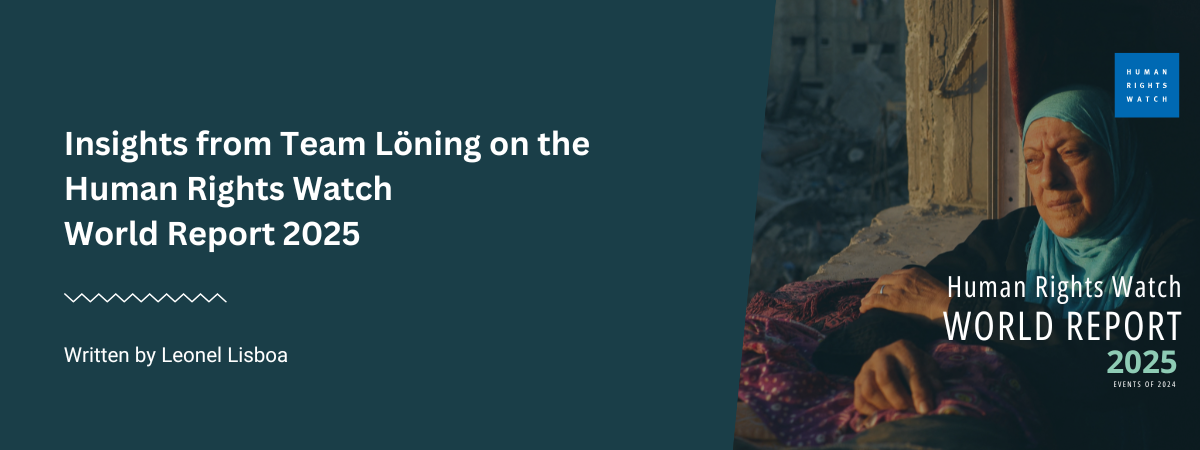Reckoning and regrouping: Löning’s take on 2024’s challenges and 2025’s prospects, inspired by HRW’s World Report
January is often a time for reflection—looking back on past events and contemplating what lies ahead. The political, legal, and economic landscape currently feels inconclusive, but there’s a palpable sense that both the pieces and the board are in motion. Reviewing the recently published World Report 2025 by Human Rights Watch provided a valuable lens to assess where we stand and where we might be heading.
The report examines human rights developments throughout 2024. Organised by country, it offers a thorough analysis of rights protections and violations worldwide. Its insights serve not only human rights generalists but also business and human rights specialists seeking actionable information for their work.
Progress in corporate accountability—but challenges remain
On a positive note, 2024 marked significant progress in corporate accountability laws, particularly within the European Union and Germany. The EU took major steps by approving the Corporate Sustainability Due Diligence Directive (CSDDD) and the EU Forced Labour Regulation (EU FLR), signaling a shift from voluntary “soft law” norms to mandatory “hard law” rules. Yet, enforcement remains a pressing issue.
Germany’s Supply Chain Due Diligence Act (LkSG) has come into force, but compliance remains a challenge for companies, particularly in high-risk industries such as mining and textiles. Meanwhile, in France, legal actions against multinational corporations and financial institutions illustrate an increasing demand for accountability in global supply chains.
Persistent threats to human rights and the environment—and its defenders
Despite these legislative advances, businesses still operate in environments where human rights are at risk. Labour protections remain weak in many countries. In Bangladesh, garment workers protesting for fair wages faced repression, while concerns about child labour in agricultural supply chains persist in the U.S. China remains under scrutiny for the systematic forced labour of Uyghurs, particularly in the textile, electronics, and renewable energy sectors. Similarly, Ethiopia’s garment industry workers face low wages and unsafe conditions, underscoring the continued struggle for fair labour standards.
Human rights defenders and environmental activists encountered heightened threats in 2024. The Democratic Republic of Congo (DRC) remains a hotspot for labour abuses in the mining sector, with reports of child and forced labour in cobalt and lithium extraction. In Indonesia, palm oil companies continue to drive deforestation, displacing Indigenous communities. Extractive industries in Mexico and Peru have been linked to human rights violations against Indigenous groups opposing mining projects. Meanwhile, corporate and state-backed surveillance in China and Russia expanded, often leveraging technology companies to suppress dissent.
Soft law vs. hard law
In Europe, Germany’s LkSG faced criticism over enforcement gaps, while the EU’s due diligence rules are still in their infancy. (Though not mentioned in the report, we are closely monitoring challenges to the EU Green Deal, particularly the potential introduction of EU Omnibus legislation, which could shift the focus back toward softer-law approaches.)
The UK and the US continue to investigate corporate complicity in forced labour, particularly in the fashion and food supply chains. The renewable energy sector is under scrutiny—China’s solar panel supply chain has been linked to forced labour, raising questions about responsible sourcing in the green economy.
A year of reckoning, a call for action
As Human Rights Watch Executive Director Tirana Hassan aptly stated, 2024 was a “Year of Reckoning”:
“For when rights are protected, humanity flourishes. When they are denied, the cost is measured not in abstract principles but in human lives.”
This report is a stark reminder that businesses, governments, and civil society must remain vigilant and collaborate. Stronger enforcement of human rights laws, better worker protections, and increased corporate accountability are crucial—alongside addressing double standards in global practices.
There is hope: progress is being made. Through collective action, we can strive for a world where human rights and business coexist harmoniously.
